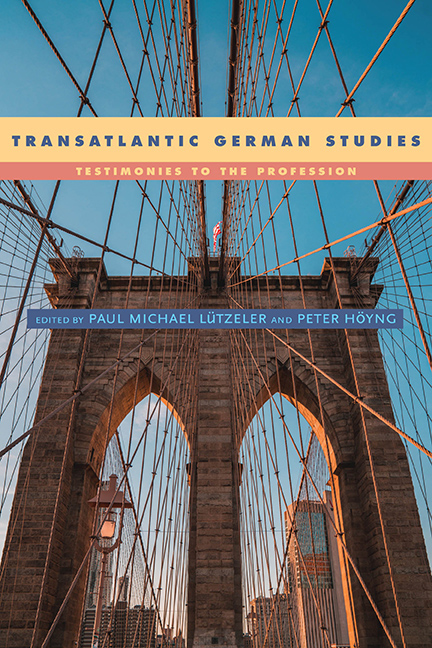Book contents
- Frontmatter
- Dedication
- Contents
- Acknowledgments
- Introduction
- From Erfahrungshunger to Realitätshunger: Futurity, Migration, and Difference
- In-between: The Participant as Observer—The Observer as Participant
- Transatlantic Space and My Own History of Globalization
- Deplazierte Personen: Why Would an American Become a Germanist?
- Metamorphoses and Meanderings of a Wanderer between Worlds
- German Studies as Vocation: My Path into It, Out of It, and Back into It
- My Long Way from Germanistik to Afro German Studies
- Mustang Red: My American Road to Critical Theory
- Third Place: How a French Germanist Became an Applied Linguist in America
- Transatlantic Exchanges: German Studies—European and American Style
- Being at Home in the Other: Thoughts and Tales from a Typically Atypical Germanist
- After Australia: Triangulating an Intellectual Journey
- A Tale in Translation: An Academic Itinerary from Istanbul to Bryn Mawr
- Beyond Passing: Transculturation in “Contact Zones”
- Far from Where? Germanistik between the Continents
- Epilogue: The Usefulness of Useless Studies
- Index
Third Place: How a French Germanist Became an Applied Linguist in America
Published online by Cambridge University Press: 14 February 2019
- Frontmatter
- Dedication
- Contents
- Acknowledgments
- Introduction
- From Erfahrungshunger to Realitätshunger: Futurity, Migration, and Difference
- In-between: The Participant as Observer—The Observer as Participant
- Transatlantic Space and My Own History of Globalization
- Deplazierte Personen: Why Would an American Become a Germanist?
- Metamorphoses and Meanderings of a Wanderer between Worlds
- German Studies as Vocation: My Path into It, Out of It, and Back into It
- My Long Way from Germanistik to Afro German Studies
- Mustang Red: My American Road to Critical Theory
- Third Place: How a French Germanist Became an Applied Linguist in America
- Transatlantic Exchanges: German Studies—European and American Style
- Being at Home in the Other: Thoughts and Tales from a Typically Atypical Germanist
- After Australia: Triangulating an Intellectual Journey
- A Tale in Translation: An Academic Itinerary from Istanbul to Bryn Mawr
- Beyond Passing: Transculturation in “Contact Zones”
- Far from Where? Germanistik between the Continents
- Epilogue: The Usefulness of Useless Studies
- Index
Summary
NOT ONLY HAVE I AGREED to tell my story, but I am grateful to Peter Höyng and Paul Michael Lützeler for giving me the opportunity and thereby the responsibility, as Judith Butler would say, to “give an account of myself,” that is, “to make myself intelligible to myself and to you” (Butler 2005, 21). In so doing, however, I have to follow narrative rules that are not of my making. Explaining in English how I became the French Germanist and American applied linguist that I became is bound to be unfaithful to the French teenager that I was, to the German immigrant that I became, and to the American citizen that I now am. The “I” that emerges through a retroactive understanding of myself is both enabled and limited by the need to make myself plausible, that is, recognizable, to my fellow American Germanists. So I have to rely on the truth of my narrative to give an account in American English of an experience that I lived in three different languages, three different modes of thought, three different modes of being.
My earliest memories of German and Germany are steeped in war. June 1940: an aeroplane dropping from the sky in flames over Boulogne Billancourt as seen from our fifth-floor balcony in Neuilly. I am five. I find the sight amusing. But the face of my mother tells me otherwise: I read in her eyes the terror of war. I know that my father is French, my mother English. I don't know she is Jewish, nor would I understand what that means, for as far as I am concerned, she is now Roman Catholic, like me.
My younger sister and I were evacuated that summer to go and live with our French grandmother in the South of France, while my mother stayed with my father in German occupied Paris. We learned to read, write, and do math in the one big schoolroom—l’école communale. The winters were wicked, particularly the winter of 1942. Freezing cold and terrible food rationing. My memories from that period are filled with conflicting experiences. One of them is my French grandmother translating for us some German fairytales from a mysterious looking book before going to bed.
- Type
- Chapter
- Information
- Transatlantic German StudiesTestimonies to the Profession, pp. 144 - 159Publisher: Boydell & BrewerPrint publication year: 2018

